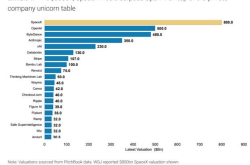After losing 1.45 billion yuan in 5 years, where is Xu Shaochun taking Kingdee?
![]() 10/30 2024
10/30 2024
![]() 499
499
The software industry has been particularly lively recently.
Following Oracle, IBM, and Salesforce, another international software giant SAP announced the "downgrade" of its Greater China region, marking the end of SAP's Greater China region and the formation of a new Asia-Pacific region.
This also means that domestic software enterprises have more opportunities.
However, Kingdee International, a cloud-based enterprise management SaaS company, may not be able to remain optimistic, as it has yet to achieve profitability.
At the same time, although Kingdee hopes to find a breakthrough by going overseas, the journey has not been smooth.
The outside world is also more concerned about when Kingdee, which has been undergoing transformation for many years, can break through various difficulties and truly achieve profitability?
1. Losing 1.454 billion yuan, struggling with profitability
Some time ago, Kingdee released its latest 2024 interim report.
The financial report shows that in the first half of 2024, Kingdee International's total revenue was 2.87 billion yuan, an increase of 11.9% year-on-year, with a narrowing of net profit loss by 23.17%. However, it still has not achieved profitability.
In fact, Kingdee has been plagued by profitability issues for as long as four and a half years.
According to financial reports in recent years, from 2020 to 2023, Kingdee's net losses were 335 million yuan, 302 million yuan, 389 million yuan, and 210 million yuan, respectively. Coupled with a loss of 218 million yuan in the last six months, Kingdee International has accumulated net losses of approximately 1.454 billion yuan in just four and a half years.
At the same time, institutional expectations are also not optimistic, which is highly alarming.
According to the International Finance News, Citibank previously predicted that Kingdee International would earn 45 million yuan in profits, but now it has downgraded its revenue forecasts for fiscal years 2024 to 2026 by 3% to 7% and expects a loss of 101 million yuan in fiscal year 2024. Citibank has also downgraded its net profit forecasts for fiscal years 2025 and 2026 from 390 million yuan and 507 million yuan to 260 million yuan and 312 million yuan, respectively.
Ultimately, Kingdee International's difficulty in achieving profitability is mainly due to the severe losses incurred by its cloud services business. Financial reports show that in the first half of this year, Kingdee's cloud services business lost 347 million yuan, which has become the main factor dragging down the company's overall performance to some extent.
Although Kingdee's traditional enterprise resource planning (ERP) business remains profitable, its profitability has significantly declined. During the reporting period, the revenue of the traditional ERP business declined by 8.8% year-on-year to 480 million yuan, and its profitability plummeted by 84.5% from 28.81 million yuan in the same period last year to 4.456 million yuan.
In fact, Kingdee's profitability performance was not weak before. From 2015 to 2019, Kingdee accumulated profits of 1.489 billion yuan, with a gross margin consistently around 80%.
However, since 2020, when cloud service revenue surpassed traditional ERP revenue and became the new pillar business, Kingdee International's profitability has become difficult to describe, shifting from profitability to losses.
In March 2021, Xu Shaochun, the founder and CEO of Kingdee Group, placed high hopes on the cloud services business and even made a bold statement: Over the next three years, the goal is to recreate Kingdee using a subscription model.
However, three years have passed, and the cloud services business has indeed become the backbone of Kingdee's performance. As of the first half of 2024, cloud services revenue reached 2.39 billion yuan, an increase of 17.2% year-on-year, accounting for 83.25% of total revenue.
But its profit performance is clearly not up to the task of carrying the load.
On the surface, Kingdee has transformed from a traditional vendor to a cloud services vendor, but it is still trapped in a difficult profitability situation. Although Kingdee has tried to reduce costs and increase efficiency to achieve profitability as soon as possible, the effect has not been significant.
2. Cloud services business transformation is difficult to describe
Kingdee has always had high expectations for cloud services and was one of the earliest companies in the industry to embark on a cloud transformation.
As early as the end of 2012, Kingdee had proposed the concept of "cloud transformation" and officially announced the launch of its cloud services strategy at the Kingdee Cloud Services Experience Conference held in April of that year.
In 2014, with the launch of "Yonyou Cloud" by competitor Yonyou Network, Xu Shaochun, the helmsman of Kingdee, personally destroyed servers in front of over a thousand employees and announced the establishment of the "ERP Cloud Services Business Department," marking an important milestone in Kingdee International's move towards cloud transformation.
Undoubtedly, cloud services belong to an emerging industry with broad market prospects. However, for companies to seize opportunities, expand their market share in cloud services, and attract more new customers, they need to continuously optimize their products to maintain customer retention.
Over the years, Kingdee has primarily served small and medium-sized enterprises. However, these enterprises usually have shorter lifecycles, greater fluctuations, and relatively weaker willingness to pay. Judging from Kingdee's NDR indicator, the renewal rates of small and medium-sized enterprises, especially micro-enterprises, are also unsatisfactory.
Therefore, in recent years, Kingdee has invested heavily in technology research and development and marketing promotion to promote the development of its cloud services business and attract large enterprise customers. For example, in the first half of 2023, Kingdee International's marketing and promotion expenses, administrative expenses, and research and development expenses reached 1.142 billion yuan, 239 million yuan, and 744 million yuan, respectively, with year-on-year increases of 8.8%, 2.1%, and 6.6%, respectively.
According to market research data, from 2020 to 2022, Kingdee International's total cost in research and development reached 3.601 billion yuan. At the same time, its sales and promotion expenses have increased for three consecutive years, totaling 5.233 billion yuan. If administrative expenses are added, the total amount of these three expenses has climbed to 10.218 billion yuan in three years.
To some extent, Kingdee's efforts have paid off to some extent. According to Zhongtai Securities research reports, during the mid-year reporting period this year, Kingdee successfully signed contracts and won bids from many industry leaders, including PetroChina, China Aviation Group, Dongfeng Motor, Beijing Enterprises Water Group, and other companies.
However, small and medium-sized enterprises still account for a large portion of Kingdee's revenue.
At the product level, Kingdee Cloud Starlight is aimed at the integration of business, finance, and taxation for small and micro-enterprises; Kingdee Cloud Starry Sky targets high-growth enterprises; while Kingdee Cloud Starry Ocean and Kingdee Cloud Sky are primarily aimed at large and very large enterprise customers.
According to Kingdee's interim financial report for the first half of 2024, during the reporting period, Kingdee Cloud Sky and Kingdee Cloud Starry Ocean collectively recorded cloud services revenue of approximately 546 million yuan. Kingdee Cloud Starry Sky and Starlight still account for a large proportion of cloud services revenue.
Shen Meng, Executive Director of Centurion Capital, believes that Kingdee International has continued to face huge losses during its transition to a cloud computing architecture, which may expose deficiencies in its transformation strategy. As a well-known enterprise in the field of finance and ERP, Kingdee International has failed to fully leverage the cost advantages of cloud computing during its transformation process, and lacks both understanding and practical experience in cloud computing.
Perhaps for Kingdee, in addition to continuing to tap into more profitable large enterprise customers, adjusting its transformation strategy is also one of the issues it needs to consider.
3. Going overseas is not a panacea
According to professional forecasts by Zhiyan Consulting and Qianzhan Industry Research Institute, China's ERP market is expected to expand vigorously at a compound annual growth rate of 10.8% from 2022 to 2027.
Obviously, from a long-term perspective, the Internet service industry remains a very promising sector with significant untapped potential.
However, the domestic competition is already fierce. In addition to its old rival Yonyou, Huawei has also joined the race.
In June this year, China National Nuclear Corporation announced that Huawei had won the bid for its pre-research technical support services for a new generation of ERP products, adopting a single-source procurement method for an amount of 20 million yuan. Although the amount is not large, as Huawei's first publicly disclosed external customer for MetaERP, this project has attracted much attention.
Therefore, Kingdee is actively preparing to go overseas in search of new growth opportunities.
In 2023, Kingdee embarked on a global development strategy and positioned itself as "a globally leading and China's top enterprise management cloud SaaS company."
Zhang Yong, President of Kingdee International China, said, "In the next decade, Kingdee International will make breakthroughs in the international market and strive to achieve the largest market scale in the Asia-Pacific region by 2026 and rank among the top five globally by 2030."
The market is optimistic about Kingdee's overseas expansion.
According to Tianyancha data, Kingdee received a strategic investment of 200 million USD from the Qatar Investment Authority at the end of 2023, reflecting the overseas market's confidence in Kingdee's overseas expansion plans.
Last August, Kingdee officially established an international business department and primarily expanded into the Southeast Asian market. In July of this year, Kingdee established a subsidiary in Singapore and began serving local cloud customers in August. At the same time, Kingdee also opened offices in Vietnam, Thailand, and other places.
Furthermore, to meet the digital transformation needs of local enterprises, Kingdee plans to build a delivery team in Malaysia, aiming to establish an overseas delivery service network through a combination of self-built and partnered approaches in the future.
According to Stockstar, in the first half of 2024, Kingdee International signed new contracts with 121 enterprises, expanding its business footprint to countries and regions such as Indonesia, Singapore, Thailand, Vietnam, the Philippines, the United States, and Europe. It successfully partnered with companies like Minglida Precision and Tangqun Seats, generating overseas market revenue of 22.098 million yuan, an increase of 8.2% year-on-year from 20.423 million yuan in the same period in 2023.
However, going overseas will face various challenges, such as geopolitics, religion, culture, and economics.
Previously, Xu Shaochun confidently stated, "The golden decade for Chinese enterprise software SaaS has arrived." However, the immediate challenge for Kingdee is to achieve profitability as soon as possible to boost investor confidence. Rapidly completing the cloud transformation and finding a second growth curve through overseas expansion are urgent issues for Kingdee to address.






